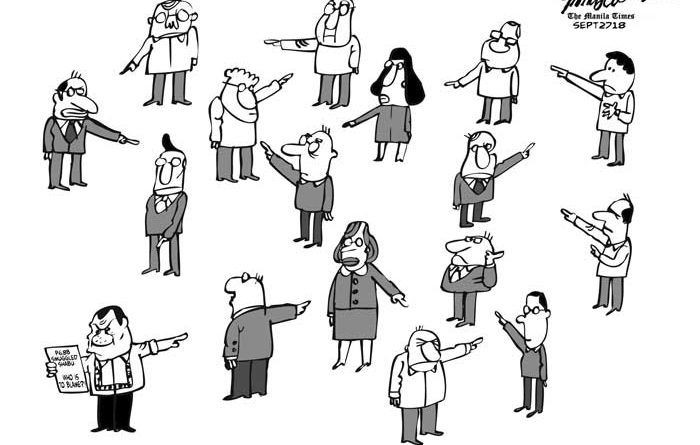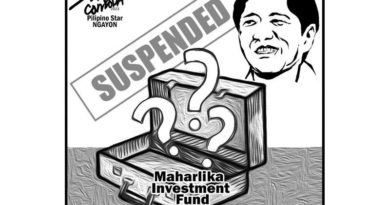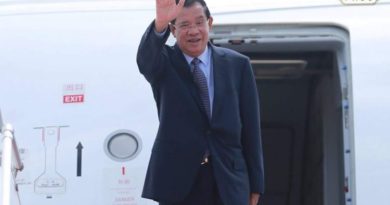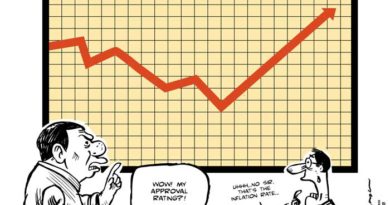OP ED COLUMN: OPINION ON PAGE ONE- Two roads to revisionism
THE arrest order against Sen. Antonio Trillanes 4th by the Makati Regional Trial Court Branch 150 for the crime of rebellion, which the same court had earlier dismissed pursuant to President B. S. Aquino 3rd’s 2010 amnesty proclamation for the participants in the 2003 Oakwood mutiny, invites a serious and urgent re-examination of the nation’s state of justice and rule of law. It isn’t clear, though, whether it is Congress or the legal academic community which has the mandate, the competence, the inclination, or the moral energy to pursue such inquiry.
Judge Elmo Alameda’s arrest order was in compliance with a motion from Justice Secretary Menardo Guevarra, who moved that the old case against Trillanes be revived despite the constitutional prohibition against double jeopardy, after President Rodrigo Duterte declared in Proclamation 572 that Aquino’s amnesty Proclamation 75, duly concurred in by Congress, was, insofar as Trillanes was concerned, null and void ab initio.
The reason DU30 cited in his August 31, 2018 proclamation was that Trillanes allegedly failed to apply for the amnesty and failed to admit his guilt. After it was shown by documentary evidence that neither allegation was true, DU30 amended his position, without actually modifying his proclamation, saying it was merely Defense Secretary Voltaire Gazmin rather than Aquino himself who approved Trillanes’ amnesty. Judge Alameda ordered the arrest after Trillanes failed to produce a copy of his original application for amnesty, even though he had Gazmin’s certification that he had applied for, and been granted, amnesty.
Midnight for the law
With these developments, we have descended into one of our darkest nights in the world of law. Some basic questions need to be promptly clarified.
1. Does the President have the power, all by himself, to declare an amnesty granted by a previous President with the full concurrence of Congress, null and void ab initio? Isn’t a question on the validity of a law or presidential act a judicial issue that should be decided by the Supreme Court rather than by the President himself who is questioning the validity of the law or the presidential act?
2. Since DU30 is questioning the validity of Aquino’s proclamation, which had been concurred in by Congress, shouldn’t he have gone to court for relief, instead of declaring all by himself the proclamation null and void ab initio? Isn’t the validity of DU30’s proclamation the one in issue at this point rather than that of Aquino’s proclamation, which has not been questioned in court?
3. Is there any legal basis for the Makati RTC to nullify its previous action extinguishing the rebellion charges against Trillanes, without any ruling from the Supreme Court that Aquino’s amnesty proclamation was in fact void ab initio?
4. Does Trillanes or any amnesty recipient have the burden of producing a copy of his application for amnesty after it has been approved? Isn’t the official certification in Trillanes’ hands that he has been granted amnesty sufficient proof that he had, in fact, applied for it and been granted it?
5. Since amnesty is granted to a class of offenders, rather than to specific individuals, for whom pardon rather than amnesty is the presidential act of clemency, could it not be presumed that Trillanes, as the known leader of the mutinous group, had, in fact, applied for amnesty, even without need of documentary evidence? Why then this determined effort to swat legal flies and establish a crime where none exists?
There are more.
There is no way to misunderstand these questions, and no way to avoid the answers. The Constitution and jurisprudence are clear. Yet the law of the strong tends to override the strength of the law, and our government of laws tends to become a government of men — or more specifically of one man, the President. The tripartite government no longer operates; after a simple majority of the Supreme Court justices at the President’s behest declared the appointment of their Chief Justice null and void ab initio, we passed into a dark night of constitutional revisionism, from which there is no promise of immediate relief.
The President has become the supreme judge, no longer the Supreme Court which remains supreme only with his concurrence or consent. Thus, the court cannot declare any act of the President unconstitutional now no matter how manifestly unconstitutional it is. He has also become the principal lawmaker, no longer the legislature, which can only legislate what he allows them to legislate. Thus, he will not allow Congress to tell him his proposed federalism is nonsense, and the Constitution does not allow him to propose constitutional amendments.
Enrile’s revisionism
This is the first road to revisionism we can talk about. The second road involves our Martial Law history, which recently highlighted a televised conversation between former Senate President Juan Ponce Enrile and former senator Ferdinand “Bongbong” Marcos Jr., son and namesake of the late former president Ferdinand Marcos.
Enrile made the unfortunate mistake of saying, without the necessary qualifications, that nobody was ever detained during Martial Law solely for their political beliefs. This led to his being lectured on historical revisionism by some ageing politicians, including former Senate President Aquilino “Nene” Pimentel, who is trying very hard to revise his understanding of responsible constitutional democracy by supporting the effort to railroad DU30’s absurd federalism.
At 94, Enrile is not free from certain memory issues. But he hasn’t quite lost it yet. AI have interviewed him on my weekly cable TV show at least thrice, and found his grasp of historical detail unimpaired. So is the rigor of his reasoning, which one does not always find in the younger set. Still, Enrile may have slipped a little when he sat down with Bongbong to take a second, or third, or fourth, or even 46th hard look at Marcos Senior’s 1972 martial law proclamation when he was the secretary of national defense.
I thought he should have faced a well-known political adversary — Jose Ma. Sison, Luis Jalandoni, Benito Tiamson, Fidel Agcaoili, or Satur Ocampo — rather than somebody who shared his view of history and politics. What he said was not necessarily false. But it was an incomplete statement. Marcos never jailed anyone just because they had read Das Kapital, the Communist Manifesto or Mao Zedong’s Red Book. That was obviously what he meant, except that his articulation was incomplete and imprecise.
In that turbulent time, at least one military sergeant made the mistake of questioning a senior newspaper editor for owning a suspicious-looking book entitled, “The Sexual Revolution.” Indeed, some mistakes were made, and they were corrected, but as a rule, only those who were involved or suspected to be involved in the communist plot to overthrow the government were arrested and detained.
Unfortunately, this did not spare some genuine nationalists who did not mind using the Left in their own effort to undermine Marcos. The former leader of the Light a Fire Movement made this private revelation to me during an important social at the Manila Polo Club last year a few weeks before he died. Enrile’s controversial statement was more of an oversimplification — a hyperbole — of his reading of the situation then obtaining rather than a cold-blooded revision of history.
The real revisionism
The real revisionism of our martial law history tried to make the young and the innocent believe that communism was the cure to the various diseases of Philippine society, and that Marcos’ Martial Law robbed the nation of that cure. Marcos nearly totally defeated the armed rebellion that threatened to take over his government and the rest of Philippine society, but after he fell in a civilian-supported military mutiny in 1986, his immediate successor released and amnestied all the detained enemies of the state.
This allowed the communists to continue their armed struggle, even after the Cold War ended, Soviet communism fell apart, and China shifted to free market capitalism.
Today, DU30 continues to talk about a “Red October” communist plot to oust him from the presidency, but it was DU30 himself who started talking about a revolutionary coalition government with the CPP/NPA/NDF, and who appointed several CPP central committee members to his Cabinet without the benefit of a peace agreement. The most important of these appointees — Cabinet Secretary Leoncio Evasco Jr. — appears to be as healthy as the President; he just had a pacemaker installed and continues to run the Office of the President and so many other special agencies.
 All photographs, news, editorials, opinions, information, data, others have been taken from the Internet ..aseanews.net | [email protected] |.For comments, Email to :D’Equalizer | [email protected] | Contributor
All photographs, news, editorials, opinions, information, data, others have been taken from the Internet ..aseanews.net | [email protected] |.For comments, Email to :D’Equalizer | [email protected] | Contributor









